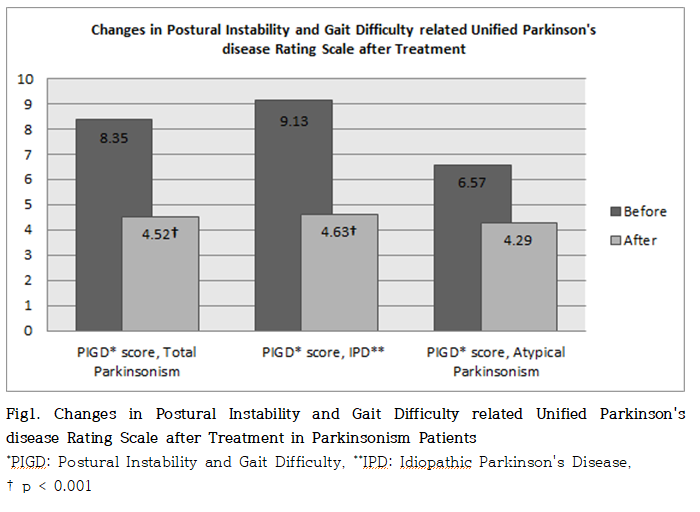Session Information
Date: Saturday, October 6, 2018
Session Title: Parkinson’s Disease: Clinical Trials, Pharmacology And Treatment
Session Time: 1:45pm-3:15pm
Location: Hall 3FG
Objective: The purpose of this study was to investigate the effects of Korean Medicine on postural instability and gait difficulty (PIGD) in patient with parkinsonism.
Background: Parkinsonism is a clinical syndrome characterized by tremor, bradykinesia, rigidity, and postural instability. Parkinsonism includes idiopathic parkinson’s disease and atypical parkinsonism such as multiple system atrophy, progressive supranuclear palsy, corticobasal degeneration and dementia with Lewy bodies etc. Postural instability, a major cause of falls, is associated with gait difficulty in the late stage of idiopathic Parkinson’s disease, which is called postural instability and gait difficulty (PIGD), and is a symptom of atypical Parkinson’s syndrome. Although the effects of herbal treatment on Parkinson’s disease have been reported through several studies and there have been studies on the effects of a relatively long-term combination of Korean Medicine, there is not enough research on the short-term effects of Korean Medicine.
Methods: We reviewed the charts of patients with parkinsonism who were admitted to the hospital from October 2009 to May 2017. They had been treated by Korean Medicine including acupuncture, bee venom acupuncture, moxibustion, herbal medicine. We analyzed the data of UPDRS (Unified Parkinson’s disease rating scale) and calculated PIGD score in the UPDRS before and after the admission.
Results: The average of PIGD score for the 23 patients of Parkinsonism significantly decreased from 8.35 ± 5.13 to 4.52 ± 3.68 after treatment.(p < 0.001) The average of PIGD score for the 16 patients of idiopathic parkinson's disease and 7 patients of atypical Parkinsonism decreased from 9.13 ± 4.46 to 4.63 ± 4.15 (p < 0.001) and from 6.57 ± 6.45 to 4.29 ± 2.56 (p > 0.05) after treatment, respectively.
Conclusions: These results provide that Korean Medicine has an effect on the motor function of patients who suffer from Parkinsonism with Postural Instability and Gait Difficulty. Furthermore it could be effective for improving activities of daily life.
References: Yang SB, Kim YJ, Lee HM, Lee HJ, Cho SY, Park JM, et al. Effects of Korean Medicine on Patients with Idiopathic Parkinson’s Disease: A Retrospective Study. J. Int. Korean Med. 2016;37(4):653-660. Zhang G, Xiong N, Zhang Z, Liu L, Huang J, Yang J, et al. Effectiveness of traditional Chinese medicine as an adjunct therapy for Parkinson’s disease: a systematic review and meta-analysis. PLoS One. 2015;10(3):e0118498.
To cite this abstract in AMA style:
HM. Lee, SB. Yang, SY. Cho, JM. Park, CN. Ko, SU. Park. Effects of Korean Medicine on Postural Instability and Gait Difficulty in Patient with Parkinsonism [abstract]. Mov Disord. 2018; 33 (suppl 2). https://www.mdsabstracts.org/abstract/effects-of-korean-medicine-on-postural-instability-and-gait-difficulty-in-patient-with-parkinsonism/. Accessed December 15, 2025.« Back to 2018 International Congress
MDS Abstracts - https://www.mdsabstracts.org/abstract/effects-of-korean-medicine-on-postural-instability-and-gait-difficulty-in-patient-with-parkinsonism/

